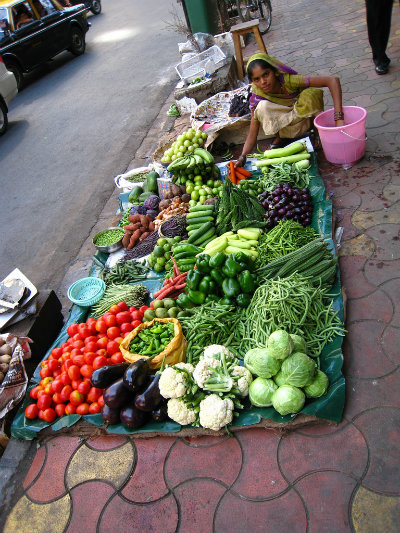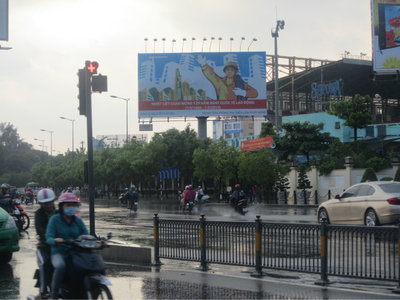There are innumerable factors that contribute to minimizing the visibility of the poor in politics, ranging from limited funds for organizing to mainstream media biases that give preference to voices of authority and power. For the working poor, unions can provide a structure for voicing grievances and a collective power for bringing about change, often in the face of resistance from employers with significantly greater individual wealth and influence. In this article, we travel from Mumbai and Bangalore to Tehran and Ho Chi Minh City to explore some of the struggles waged by unions to demand the rights of their members.
 In Mumbai, street vendors provide much-need goods and services at affordable prices and give the city its vibrancy. Despite this, their activities are largely illegal, and they are therefore vulnerable to regular bribery, harassment, and sudden eviction. Mumbai's hawkers unions have worked for decades to regularize vendors and to get society, government and police to see them as valuable contributors to the city. In order to push issues such as proper hawking and non-hawking zones based on vendors' population distribution, 40 different hawkers' unions from across Mumbai have come together to form the Pheriwala Action Committee. The India-wide National Association of Street Vendors of India has successfully successfully pushed for a National Policy for Street Vendors, but the city-level unions remain crucial in checking that national policies and acts are enforced at the ground level.
In Mumbai, street vendors provide much-need goods and services at affordable prices and give the city its vibrancy. Despite this, their activities are largely illegal, and they are therefore vulnerable to regular bribery, harassment, and sudden eviction. Mumbai's hawkers unions have worked for decades to regularize vendors and to get society, government and police to see them as valuable contributors to the city. In order to push issues such as proper hawking and non-hawking zones based on vendors' population distribution, 40 different hawkers' unions from across Mumbai have come together to form the Pheriwala Action Committee. The India-wide National Association of Street Vendors of India has successfully successfully pushed for a National Policy for Street Vendors, but the city-level unions remain crucial in checking that national policies and acts are enforced at the ground level.
Also in India, there are an estimated 4.2 million domestic workers. These millions of cooks, maids, and sweepers work behind the closed doors of individual family employers, where they work for low wages, often seven days a week, isolated with little ability to negotiate. But India's domestic workers' unions have been fighting tirelessly to bring about policy change and better conditions for decades. The Domestic Workers' Movement of Karnataka, the state containing Bangalore, has fought for official recognition for its members' work, medical coverage, protection from physical and sexual harassment, and at least one day off per week. As a result of the movement's work, Karnataka was one of the first states to institute a minimum wage for domestic workers and set better working condition requirements. These legal changes constitute a big step, but activists stress that domestic workers need to be better informed of their rights in order to ensure their protection.
 More than 90,000 workers at the Pou Yuen footwear factory in Ho Chi Minh City went on a rare one-week-long strike in March of this year. The strike was in response to a proposed law preventing workers from receiving insurance payouts during unemployment. Previously, workers paid a monthly premium into a central fund and received a payout equivalent to the premiums paid when they became unemployed. Under the new law, workers would only receive payouts when they retired. As soon as the strike broke out on March 26th, the Pou Yuen Labor Union worked with the factory board to gather workers' opinions and send them to the district government. Within the week, the National Assembly approved changes allowing workers to choose to receive their payouts at retirement age or upon unemployment. Although the labor union could have prevented the strike by acting sooner, it was a successful case of peaceful negotiation and resolution.
More than 90,000 workers at the Pou Yuen footwear factory in Ho Chi Minh City went on a rare one-week-long strike in March of this year. The strike was in response to a proposed law preventing workers from receiving insurance payouts during unemployment. Previously, workers paid a monthly premium into a central fund and received a payout equivalent to the premiums paid when they became unemployed. Under the new law, workers would only receive payouts when they retired. As soon as the strike broke out on March 26th, the Pou Yuen Labor Union worked with the factory board to gather workers' opinions and send them to the district government. Within the week, the National Assembly approved changes allowing workers to choose to receive their payouts at retirement age or upon unemployment. Although the labor union could have prevented the strike by acting sooner, it was a successful case of peaceful negotiation and resolution.
Following Iran's 1979 revolution, despite all the revolution's pro-labor campaigns and slogans, all trade unions were abolished and, instead, the Islamic Work Council was established by the Islamic government. Consequently, real minimum wage (adjusted for inflation) has been decreasing ever since, and workers can no longer afford minimum household costs. In 2004, two workers decided to reopen the Syndicate of Workers of Tehran and Suburbs Public Bus Company by referring to International Labour Organization protocols 87 and 98, which guarantees the freedom of workers' organizations in member countries, including Iran. These two pioneers started teaching workers about their legal rights, attracting more members to the syndicate. The syndicate's first General Assembly was held in June 2005, followed by a series of strikes in Tehran. Although the government brutally repressed the strikes and put the syndicate's board on trial, the movement has expanded among the workers across Iran, encompassing several other worker unions.
Check out more of the discussion on finding a voice in the politics of urban poverty
on URB.im, and contribute your thoughts.
Photo credits: Francisco Martins, Tam Nguyen